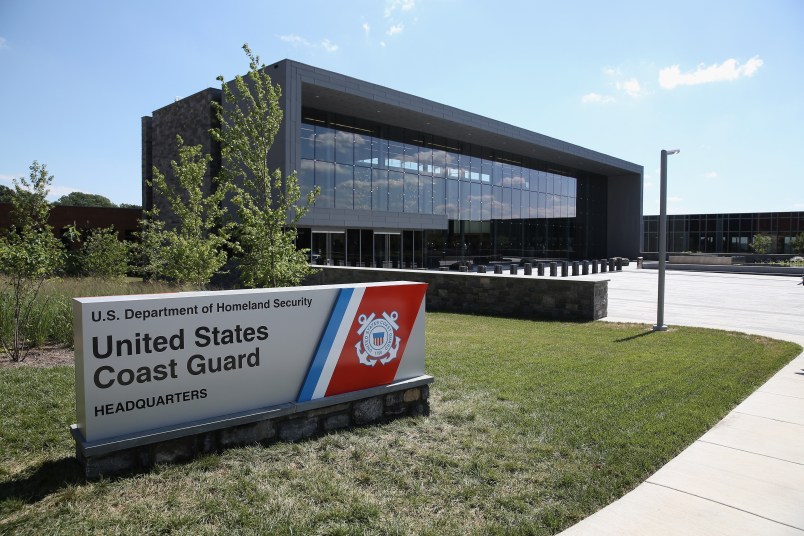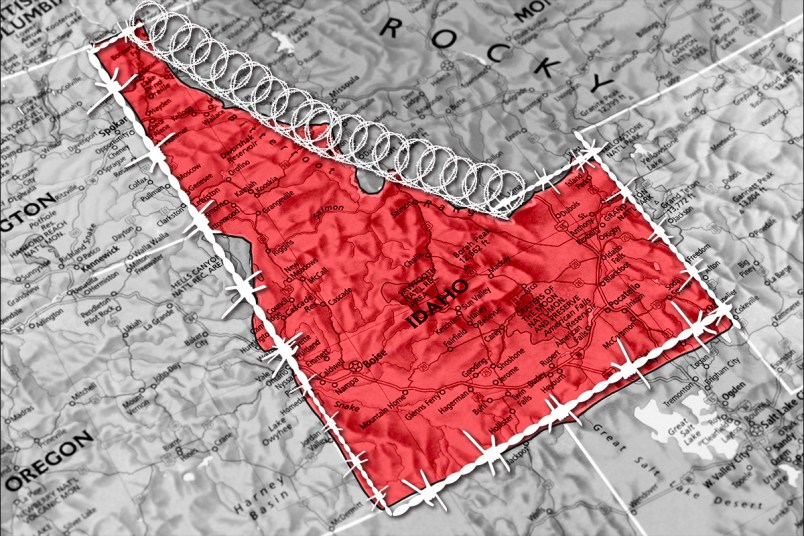A self-proclaimed white nationalist Coast Guard officer allegedly carried out research into some of the country’s most infamous mass murders on his government computer at Coast Guard headquarters in Washington, D.C.
That’s just one of many disturbing revelations about Lt. Christopher Hasson that came to light in court documents and a hearing this week following his arrest on illegal gun and drugs charges.
Federal prosecutors in Maryland have painted a picture of a man bent on committing mass violence, consumed with racist hatred, and particularly keen on injuring liberal politicians and journalists he saw as his ideological enemies. Hasson, prosecutors said, also stockpiled weapons and illegal opioids in the basement apartment he shared with his wife in Silver Spring.
Hasson is being detained pending trial after U.S. Magistrate Judge Charles Day agreed at a Thursday hearing that he posed a threat to public safety. His attorneys have argued that he never intended to act on his dark fantasies.
Here’s what we know about Hasson and the case against him.
An obsession with mass murders and creating a “white homeland”
In court filings and at Thursday’s hearing, prosecutors detailed Hasson’s violent racist fixations. In a 2017 draft email he wrote to an American neo-Nazi, he calls himself a “long time White Nationalist” with dreams of building a “white homeland” through “a little focused violence.” Prosecutors identified that neo-Nazi as infamous white separatist Harold Covington in court, according to the Associated Press.
In another 2017 draft email he sent himself, Hasson describes “dreaming of a way to kill almost every last person on the earth,” perhaps through biological weapons like “Spanish flu, botulism, anthrax.”
“Much blood will have to be spilled to get whitey off the couch,” he wrote, adding that “liberalist/globalist ideology is destroying traditional peoples esp white.”
As part of his preparation for the race war he believed was eminent, court documents say, he built up a cache of weapons consisting of some 15 guns, including several rifles, and over 1,000 rounds of ammunition. Federal prosecutor Jennifer Sykes said he spent some $14,000 on weapons and tactical survival gear, according to the AP.
A hit list of top journalists and Democratic politicians
One of the more jarring exhibits turned over as evidence was an Excel spreadsheet that prosecutors described as a hit list of targets Hasson wanted to kill.
The list includes the names of prominent Democratic politicians including Senate Majority Leader Chuck Schumer (D-NY) and a trio of Democratic presidential candidates in the Senate: Kirsten Gillibrand (D-NY), Kamala Harris (D-CA), and Elizabeth Warren (D-MA). MSNBC anchor Chris Hayes and CNN anchor Chris Cuomo were also on the list.
Prosecutor note in the court filing that on the same day he drew up the list, he searched Google for phrases like “what if trump illegally impeached,” “where in dc to congress live,” and “civil war if trump impeached.”
Trump, who has verbally attacked journalists by name and cheered a congressman for physically assaulting a reporter, has not addressed the Hasson case. Asked about his silence on it, White House Press Secretary Sarah Sanders said that she didn’t believe the President “has done anything but condemn violence against journalists or anyone else.”
Hasson’s dark fantasy world overlapped with his military day job
Hasson, who spent several years in the Marines before taking a desk job at the Coast Guard’s Washington, D.C. headquarters, did not leave his troubling fixations at home.
Instead, Sykes said, Hasson routinely spent hours searching for information on mass murders and their crimes on his government computer during work hours, the AP reported.
The AP said that the focus of his searches included Unabomber Ted Kaczynski, Virginia Tech mass shooter Seung-Hui Cho, and Eric Rudolph, the extremist who committed a series of anti-LGBT and anti-abortion bombings in the late 1990s.
Sykes also alleged that Hasson consumed the illegal opioid Tramadol while at work, according to the AP.
Hasson’s attorneys say he never meant to act on his threats
Public defender Julie Stelzig argued in court that prosecutors are making too much of Hasson’s words, failing to prove that he actually meant to carry out any violent acts.
“We are not yet a country that detains people for their internet searches or deleted documents,” Stelzig said in court, criticizing prosecutors’ “histrionic characterization” of Hasson’s intentions, according to the New York Times.
The Times reported that Stelzing described Hasson as a loving husband and father, arguing that the trove of weapons he kept stores was “modest at best” in a gun-obsessed country like the U.S., particularly for a Marine Corps veteran.
Obscure charge used to arrest Hasson
Prosecutors used an unusual charge to secure Hasson’s arrest: possessing firearms as an “unlawful user or addict of controlled substances.”
The same rather obscure charge was brought against Jeffrey Clark, the Washington, D.C.-based neo-Nazi arrested last year for possessing marijuana plants and a trove of guns.
Peter Simi, an expert on extremism at Chapman University, told TPM that prosecutors were likely just relying on any applicable criminal statute that would allow them to bring a potentially dangerous individual into custody as quickly as possible.
Judge Day said he will likely revisit his decision to keep Hasson behind bars pending trial unless prosecutors can bring more serious charges in the next 14 days, according to the Times. The newspaper reported that prosecutors suggested they would file terrorism-related charges prior to that deadline.






